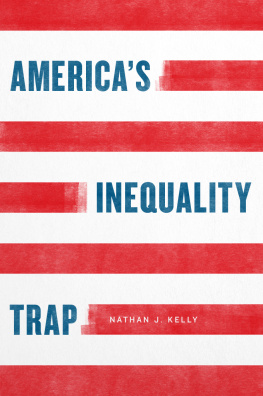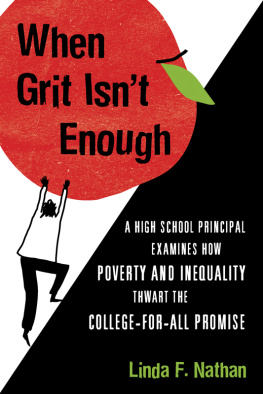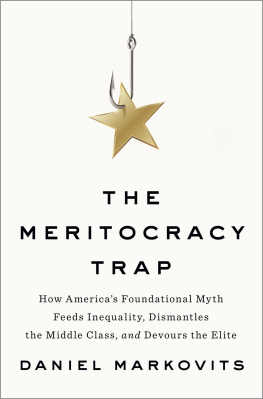Americas Inequality Trap
Chicago Studies in American Politics
A series edited by Benjamin I. Page, Susan Herbst, Lawrence R. Jacobs, Adam J. Berinsky, and Frances Lee
Also in the series:
GOOD ENOUGH FOR GOVERNMENT WORK : THE PUBLIC REPUTATION CRISIS IN AMERICA ( AND WHAT WE CAN DO TO FIX IT ) by Amy E. Lerman
WHO WANTS TO RUN ? HOW THE DEVALUING OF POLITICAL OFFICE DRIVES POLARIZATION by Andrew B. Hall
FROM POLITICS TO THE PEWS : HOW PARTISANSHIP AND THE POLITICAL ENVIRONMENT SHAPE RELIGIOUS IDENTITY by Michele F. Margolis
THE INCREASINGLY UNITED STATES : HOW AND WHY AMERICAN POLITICAL BEHAVIOR NATIONALIZED by Daniel J. Hopkins
LEGACIES OF LOSING IN AMERICAN POLITICS by Jefferey K. Tulis
LEGISLATIVE STYLE by William Bernhard
WHY PARTIES MATTER : POLITICAL COMPETITION AND DEMOCRACY IN THE AMERICAN SOUTH by John H. Aldrich
NEITHER LIBERAL NOR CONSERVATIVE : IDEOLOGICAL INNOCENCE IN THE AMERICAN PUBLIC by Donald R. Kinder
STRATEGIC PARTY GOVERNMENT : WHY WINNING TRUMPS IDEOLOGY by Gregory Koger
POST - RACIAL OR MOST - RACIAL ?: RACE AND POLITICS IN THE OBAMA ERA by Michael Tesler
THE POLITICS OF RESENTMENT : RURAL CONSCIOUSNESS IN WISCONSIN AND THE RISE OF SCOTT WALKER by Katherine J. Cramer
Americas Inequality Trap
NATHAN J. KELLY
The University of Chicago Press
Chicago and London
The University of Chicago Press, Chicago 60637
The University of Chicago Press, Ltd., London
2019 by The University of Chicago
All rights reserved. No part of this book may be used or reproduced in any manner whatsoever without written permission, except in the case of brief quotations in critical articles and reviews. For more information, contact the University of Chicago Press, 1427 E. 60th St., Chicago, IL 60637.
Published 2019
Printed in the United States of America
28 27 26 25 24 23 22 21 20 19 1 2 3 4 5
ISBN-13: 978-0-226-66547-4 (cloth)
ISBN-13: 978-0-226-66550-4 (paper)
ISBN-13: 978-0-226-66564-1 (e-book)
DOI: https://doi.org/10.7208/chicago/9780226665641.001.0001
Library of Congress Cataloging-in-Publication Data
Names: Kelly, Nathan J., author.
Title: Americas inequality trap / Nathan J. Kelly.
Other titles: Chicago studies in American politics.
Description: Chicago : The University of Chicago Press, 2019. | Series: Chicago studies in American politics | Includes bibliographical references and index.
Identifiers: LCCN 2019032051 | ISBN 9780226665474 (cloth) | ISBN 9780226665504 (paperback) | ISBN 9780226665641 (ebook)
Subjects: LCSH: Income distributionPolitical aspectsUnited States. | WealthPolitical aspectsUnited States. | EqualityPolitical AspectsUnited States. | ElectionsUnited StatesEconomic aspects. | United StatesPolitics and government20092017.
Classification: LCC HC110.I5 K45 2019 | DDC 339.2/20973dc23
LC record available at https://lccn.loc.gov/2019032051

This paper meets the requirements of ANSI/NISO Z39.48-1992 (Permanence of Paper).
To Arwen Hope Morgan Kelly, whose life gives joy every day and renders it both easier and more essential to imagine the world as it should be
CONTENTS
Contemporary Politics and the Perpetuation of Inequality
As returns started coming in on the evening of the 2016 presidential election, Democrats were prepared for celebration. With the election coming on the heels of two terms with Barack Obama in the White House, most indicators were pointing to another four years of Democratic control. The polls had Hillary Clinton in the lead. The prediction models suggested that Donald Trump had only a moderate chance for success. It even seemed possible that Democrats might capture at least one chamber of Congress, increasing their ability to make progress on their policy goals.
As more precincts across more states reported results, however, it became clear that Donald Trump was exceeding expectations. By around ten oclock that night it was apparent that Democratic optimism for another presidential victory had been misplaced and that a Republican would be elected president for the first time since the 2007 financial crisis. It was a close race, and Clinton in fact won the national popular vote just as many of the forecasts had predicted. But Trump won in the states where he needed to, particularly in working-class areas of the country that were assumed to be stable bastions of Democratic support.
Many analysts were completely befuddled. Trump was, after all, best known as a reality TV star and real estate mogul with a history of questionable business dealings. He had no political experience and demonstrated little policy knowledge. The campaign had revealed numerous potential scandals in Trumps past and featured dozens of major gaffes and inflammatory statements from the candidate. But he won anyway. How could this happen?
After time for reflection, the 2016 election might best be described as a combination of rigid partisanship and rising economic and racial resentment. In large part, mainstream Republican elites continued to support Trump regardless of his latest campaign shenanigans. The alternative was a Hillary Clinton presidency, and that outcome was impossible for committed Republican partisans to stomach. It probably wasnt difficult for them to imagine that a political neophyte like Trump could be controlled once in office, and Trumps policy statements were sufficiently vague to allow Republicans to project their preferred positions onto the candidate. Any Republican in the White House would be preferred to a Democrat in these politically polarized times. So, with some important exceptions, mainstream Republican elites did not oppose Trump once he became the partys nominee, and many lent him active support. Republicans in the mass public basically followed their lead.
Winning the votes of core Republican voters would not have been enough to win, of course. Some combination of the following had to happen for a Republican victory in 2016: converting Obama voters into Trump voters, convincing Obama voters to stay home, or getting former nonvoters off the sidelines to vote for Trump. This is where some combination of racial and economic resentment played an important role. Pundits and analysts continue to debate the role of racial bias and economic discontent in Trumps victory. Those debates, fruitlessly in my view, aim to nail down whether racism or economic conditions were the driving factor. It was likely both (and the role of sexism should also not be dismissed). A handful of scholars were pointing to these factors almost in real time during the election. In particular, Katherine Cramers (2016) study of resentment in rural Wisconsin uncovered the type of anti-elite, anticity, anti-academic, anti-immigrant, antiminority attitudes that played a central role in Trumps pitch for the presidency. And Arlie Hochschilds (2016) work pointed to similar dynamics in a deep dive into life in rural Louisiana. For those who were aware of the dynamics that these studies were describing and believed them to be part of a larger pattern, the outcome of the 2016 election was certainly understandable and, to some extent, anticipated.
Like most observers, though, I thought Hillary Clinton would win. It seemed to me she had an ample cushion in the pre-election polls, that the economic fundamentals were favorable enough for the Democrats, and that Trump was a sufficiently troubled candidate to ensure a Democratic victory. But I also had in my mind the work I was doing for this book. And it was not hard to see how Trumps victory represented a continuation of the historical patterns I was uncovering as part of this project.
 This paper meets the requirements of ANSI/NISO Z39.48-1992 (Permanence of Paper).
This paper meets the requirements of ANSI/NISO Z39.48-1992 (Permanence of Paper).











